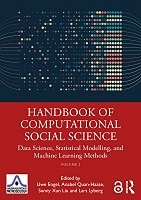Chapter 21 From Frequency Counts to Contextualized Word Embeddings
Proposal review
The Saussurean turn in automatic content analysis
| dc.contributor.author | Wiedemann, Gregor | |
| dc.contributor.author | Fedtke, Cornelia | |
| dc.date.accessioned | 2022-12-06T10:27:37Z | |
| dc.date.available | 2022-12-06T10:27:37Z | |
| dc.date.issued | 2022 | |
| dc.identifier.uri | https://library.oapen.org/handle/20.500.12657/59856 | |
| dc.description.abstract | Text, the written representation of human thought and communication in natural language, has been a major source of data for social science research since its early beginnings. While quantitative approaches seek to make certain contents measurable, for example through word counts or reliable categorization (coding) of longer text sequences, qualitative social researchers put more emphasis on systematic ways to generate a deep understanding of social phenomena from text. For the latter, several qualitative research methods such as qualitative content analysis (Mayring, 2010), grounded theory methodology (Glaser & Strauss, 2005), and (critical) discourse analysis (Foucault, 1982) have been developed. Although their methodological foundations differ widely, both currents of empirical research need to rely to some extent on the interpretation of text data against the background of its context. At the latest with the global expansion of the internet in the digital era and the emergence of social networks, the huge mass of text data poses a significant problem to empirical research relying on human interpretation. For their studies, social scientists have access to newspaper texts representing public media discourse, web documents from companies, parties, or NGO websites, political documents from legislative processes such as parliamentary protocols, bills and corresponding press releases, and for some years now micro-posts and user comments from social media. Computational support is inevitable even to process samples of such document volumes that could easily comprise millions of documents. | en_US |
| dc.language | English | en_US |
| dc.subject.classification | thema EDItEUR::J Society and Social Sciences::JM Psychology | en_US |
| dc.subject.classification | thema EDItEUR::J Society and Social Sciences::JM Psychology::JMB Psychological methodology | en_US |
| dc.subject.other | survey data, data analysis, data science, information technology, AI, socio-robotics, quantitative, survey methodology, ethics, ethical standards, privacy, replication, politics, survey design, social media, big data, social, human-robot interaction, machine learning, open data, data archives, data ownership, digital trace, unstructured data | en_US |
| dc.title | Chapter 21 From Frequency Counts to Contextualized Word Embeddings | en_US |
| dc.title.alternative | The Saussurean turn in automatic content analysis | en_US |
| dc.type | chapter | |
| oapen.identifier.doi | 10.4324/9781003025245-25 | en_US |
| oapen.relation.isPublishedBy | 7b3c7b10-5b1e-40b3-860e-c6dd5197f0bb | en_US |
| oapen.relation.isPartOfBook | 866251e4-af21-49fd-a795-9950f3c15530 | en_US |
| oapen.relation.isbn | 9780367457808 | en_US |
| oapen.relation.isbn | 9781032077703 | en_US |
| oapen.imprint | Routledge | en_US |
| oapen.pages | 21 | en_US |
| oapen.remark.public | Funder name: Johannes Kepler University Linz, Institute of Sociology | |
| peerreview.anonymity | Single-anonymised | |
| peerreview.id | bc80075c-96cc-4740-a9f3-a234bc2598f1 | |
| peerreview.open.review | No | |
| peerreview.publish.responsibility | Publisher | |
| peerreview.review.stage | Pre-publication | |
| peerreview.review.type | Proposal | |
| peerreview.reviewer.type | Internal editor | |
| peerreview.reviewer.type | External peer reviewer | |
| peerreview.title | Proposal review | |
| oapen.review.comments | Taylor & Francis open access titles are reviewed as a minimum at proposal stage by at least two external peer reviewers and an internal editor (additional reviews may be sought and additional content reviewed as required). |

